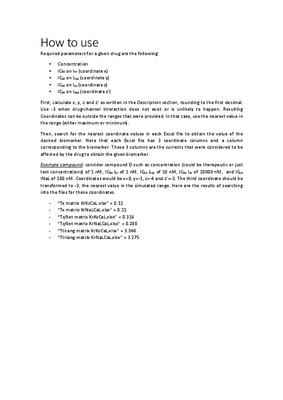Llopis Lorente, J.; Gomis-Tena Dolz, J.; Cano García, J.; Romero Pérez, L.; Saiz Rodríguez, FJ.; Trénor Gomis, BA. (2020). Tx, TqNet and Ttriang Values. Universitat Politècnica de València. https://doi.org/10.4995/Dataset/10251/136919
Por favor, use este identificador para citar o enlazar este ítem: http://hdl.handle.net/10251/136919
|
Título:
|
Tx, TqNet and Ttriang Values
|
|
Otro titulo:
|
In-Silico Classifiers for Assessment of Drug Proarrhytmicity
|
|
Autor:
|

 Llopis Lorente, Jordi
Llopis Lorente, Jordi

 Gomis-Tena Dolz, Julio
Gomis-Tena Dolz, Julio
 Cano García, Jordi
Cano García, Jordi

 Romero Pérez, Lucia
Romero Pérez, Lucia

 Saiz Rodríguez, Francisco Javier
Saiz Rodríguez, Francisco Javier

 Trénor Gomis, Beatriz Ana
Trénor Gomis, Beatriz Ana
|
|
Entidad UPV:
|
Universitat Politècnica de València. Departamento de Ingeniería Electrónica - Departament d'Enginyeria Electrònica
|
|
Fecha difusión:
|
|
|
Resumen:
|
This repository contains the Matlab functions used in [1] and six Excel files named “Tx matrix KrKsCaL.xlsx”, “Tx matix KrNaLCaL.xlsx”, “TqNet matrix KrKsCaL.xlsx”, “TqNet matrix KrNaLCaL.xlsx”, "Ttirang matrix KrKsCaL.xlsx" ...[+]
This repository contains the Matlab functions used in [1] and six Excel files named “Tx matrix KrKsCaL.xlsx”, “Tx matix KrNaLCaL.xlsx”, “TqNet matrix KrKsCaL.xlsx”, “TqNet matrix KrNaLCaL.xlsx”, "Ttirang matrix KrKsCaL.xlsx" and “Ttirang matrix KrNaLCaL.xlsx”. These files contain the value of three arrhythmogenic indices proposed in [1] (Tx, TqNet and Ttriang) resulting from simulations of drug effects on the action potential. The simulations were performed in a modified version of the O’Hara-Rudy model (ORd) [2] of human endocardial ventricular cells (492.536 simulations). References: [1]. Llopis J., Gomis-Tena J., Cano J., Romero L., Saiz J., Trenor B. In-Silico Classifiers for Assessment of Drug Proarrhythmicity. 2020 (Currently under revision) [2]. O’Hara, T.; Virág, L.; Varró, A.; Rudy, Y. Simulation of the Undiseased Human Cardiac Ventricular Action Potential: Model Formulation and Experimental Validation. PLoS Comput. Biol. 2011, 7 (5), e1002061.
[-]
|
|
Palabras clave:
|
drug-induced Torsade de Pointes
,
cardiac safety
,
Tx
,
TqNet
,
Ttriang
|
|
Derechos de uso:
|
Reconocimiento - No comercial (by-nc)
|
|
DOI:
|
10.4995/Dataset/10251/136919
|
|
Editorial:
|
Universitat Politècnica de València
|
|
Código del Proyecto:
|
info:eu-repo/grantAgreement/GVA//PROMETEO%2F2016%2F088/ES/MODELOS COMPUTACIONALES PERSONALIZADOS MULTI-ESCALA PARA LA OPTIMIZACION DEL DIAGNOSTICO Y TRATAMIENTO DE ARRITMIAS CARDIACAS (PERSONALISED DIGITAL HEART)/
info:eu-repo/grantAgreement/UPV//PAID-06-18/
info:eu-repo/grantAgreement/MINECO//DPI2016-75799-R/ES/TECNOLOGIAS COMPUTACIONALES PARA LA OPTIMIZACION DE TERAPIAS PERSONALIZADAS DE PATOLOGIAS AURICULARES Y VENTRICULARES/
info:eu-repo/grantAgreement/MCIU//FPU18%2F01659/
|
|
Descripción:
|
Every sheet in described files contains a table of numbers (doubles), resulting from the transformation of a three-dimensional matrix. To do so, the first three columns of each table contain the Coordinates x, y and z or z' of the original matrix respectively (no units). They range from -3 to 1.5. Coordinates were calculated as the logarithm of the ratio of a drug concentration (C) over the concentration that is required to inhibit a 50% of a given ion channel current (Half inhibitory concentration or IC50). They represent the block effect of such drug on four main currents which control the Action Potential shape and duration, namely, the rapid component of the potassium delayed rectifier current (IKr), the slow component of the potassium delayed rectifier current (IKs), the late sodium current (INaL) and the calcium type L current (ICaL). The following formulae can be used to deduce mentioned Coordinates: x = log_10(C/(IC_50 (I_Kr))) ; y = log_10(C/(IC_50 (I_CaL ) )); z = log_10(C/(IC_50 (I_CaL)); and z' = log_10(C/(IC_50 (I_NaL)). These are indeed part of the Hill equation (Hill coefficient set to 1), where G is the channel’s resulting conductance and G0 is the channel’s control conductance: G_[x || y || z || z'] = G_0·1/(1+C/(IC_(50, [x || y || z || z'] ) )) = G_0·1/(1+10^([x || y || z || z']) ). Conductances of the four main currents are thus translated into cardiac cellular or tissue models to study the effect of a wide range of drug concentrations. The following parameters were obtained and summarized in currently described files. Detailed methods of the performed simulations, as well as biomarker calculations, can be consulted in [1].
|
|
Agradecimientos:
|
The authors would like to strongly thank Dr. Manuel Pastor from Research Programme on Biomedical Informatics (GRIB), at Universitat Pompeu Fabra (Barcelona, Spain) for its review of the manuscript and expert opinions and ...[+]
The authors would like to strongly thank Dr. Manuel Pastor from Research Programme on Biomedical Informatics (GRIB), at Universitat Pompeu Fabra (Barcelona, Spain) for its review of the manuscript and expert opinions and suggestions. This work was partially supported by the Dirección general de Política Científica de la Generalitat Valencia (PROMETEU2016/088), Primeros Proyectos de Investigación (PAID-06-18), Vicerrectorado de Investigación, Innovación y Transferencia de la Universitat Politècnica de València (UPV), València, Spain as well as Plan Estatal de Investigación Científica y Técnica y de Innovación 2013-2016 from the Ministerio de Economía, Industria y Competitividad of Spain (DPI2016-75799-R) and AEI/FEDER, UE. JL is being funded by the Ministerio de Ciencia, Innovación y Universidades for the Formación de Profesorado Universitario (grant reference: FPU18/01659).
[-]
|
|
Tipo:
|
Dataset
|







![MS Excel file [Excel]](/themes/UPV/images/msexcel.png )
![ZIP archive [ZIP]](/themes/UPV/images/zip.png)


